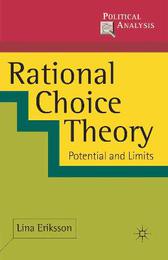
|
Rational Choice Theory: Potential and Limits
Paperback / softback
Main Details
| Title |
Rational Choice Theory: Potential and Limits
|
| Authors and Contributors |
By (author) Lina Eriksson
|
| Series | Political Analysis |
|---|
| Physical Properties |
| Format:Paperback / softback | | Pages:296 | | Dimensions(mm): Height 235,Width 155 |
|
| ISBN/Barcode |
9780230545090
|
| Classifications | Dewey:320.01 |
|---|
| Audience | | Tertiary Education (US: College) | |
|---|
|
Publishing Details |
| Publisher |
Bloomsbury Publishing PLC
|
| Imprint |
Red Globe Press
|
| Publication Date |
18 October 2011 |
| Publication Country |
United Kingdom
|
Description
Few approaches in political science have generated so much controversy as rational choice theory. Some claim that the approach has made political science scientific. Its critics argue that it involves unrealistic assumptions about individual behaviour. While its tenets and benefits remain the subject of heated debate, rational choice theory is now established as a core approach in political science and one that is vital for contemporary students of the discipline to understand. With an impressive degree of clarity, the book introduces the philosophical foundations, the methodology and the key issues of rational choice theory. It shows how the approach has been constructively used to explain political phenomena and also reflects more broadly on how theories are developed and used in political science. Balanced and insightful, this important new text gives a nuanced and elegant evaluation of the potential and limits of rational choice theory.
Author Biography
LINA ERIKSSON Lecturer in Philosophy at Flinders University, Australia.
Reviews'A subtle, insightful and provocative tour d'horizon, at once broad-brushed and pointillistic, which is sure to generate debate. I am not always persuaded, but I am impressed, and have learned much from her elegant portraits of the (many) rational choice approach(es).' - Kenneth A. Shepsle, Harvard University, USA 'Far enough removed to have critical distance, but close enough to understand the literature and what it seeks to achieve, this is a critique in the best sense of the word. Balanced, non-polemical, and examining the limits as well as the limitations of rational choice theory, it deftly and elegantly fills an important niche.' - Anthony J. McGann, University of California, Irvine, USA
|